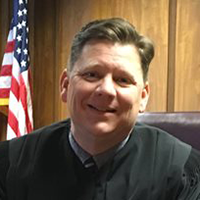Judge

Counties: County
View state court bio
Contact with Chambers
• Preferred method to contact chambers: Email
• Set forth your practices and procedures for scheduling motion hearings. Attorneys should contact our scheduling clerk, Derek Reichstadt, for a date. If there is a discovery dispute, a date for a motion to compel will not be given and no pleadings should be filed until after there is an informal discussion with the court.
• Identify any type of motion for which you do not require a hearing. Generally, a stipulated agreement to modify the scheduling order does not require a hearing. However, if there are significant changes, there should be a letter written to the Court providing the reasons why such a modification is necessary.
• Do you accept telephone calls from attorneys to rule on discovery disputes that occur during depositions? Yes.
• How much time do you allot for motion hearings? Generally, an hour is allotted, but attorneys should notify the scheduling clerk if more or less time is needed.
• Set forth your practices and procedures with respect to attending a hearing by telephone or video conference. My expectations for a telephone or video conference is the same as an in-person hearing. Parties should be dressed appropriately, in a quiet place, and have a good connection. Do not appear for a court hearing from inside your car.
• Set forth your practices and procedures with respect to discovery motions. A letter should be written to the Court outlining the issue (no more than two pages), and a informal conference with the judge will be scheduled. No formal pleadings shall be filed until after the informal conference.
• Set forth your practices and procedures with respect to stipulations of the parties, including stipulations for protective orders. In general, parties should simply e-file the stipulation along with a request that the Court sign it. The parties should also notify the clerk by email that it has been filed.
• Do you have any particular requests or procedures relating to requests to amend the scheduling order? Generally, a stipulated agreement to modify the scheduling order does not require a hearing. However, if there are significant or contested changes, there should be a letter written to the Court providing the reasons why such a modification is necessary.
• Set forth your practices and procedures with respect to default proceedings. Obtain a date and follow the rules related to supporting documents and timing. Also send a Word version of the proposed order to my law clerk, David Haddick.
• Set forth your practices and procedures with respect to handling emergency motions. Contact the Court by email briefly setting forth the basis for the emergency motion, if the Court is unavailable another judge may be assigned to hear just that motion.
• If your preferences for motion hearings by remote means differ from any of your earlier answers, please describe your preferences for remote video conference hearings.
• Do you want to receive paper courtesy copies of the parties' written submissions? If you do, set forth the number of courtesy copies and identify any document type you do not want to receive. No, I do not want paper courtesy copies.
• Set forth your preferences for handling informal requests for relief using the expedited, informal non-dispositive motion process set forth in Minn. Gen. R. practice 115.04(d). I do not think it is appropriate to "rule via email." So, a brief letter (no more than two pages) filed with the Court and emailed to the clerk setting forth the request as well as a request for a date and time to be heard is great. It is important that it is filed, so that there is a record of the request.